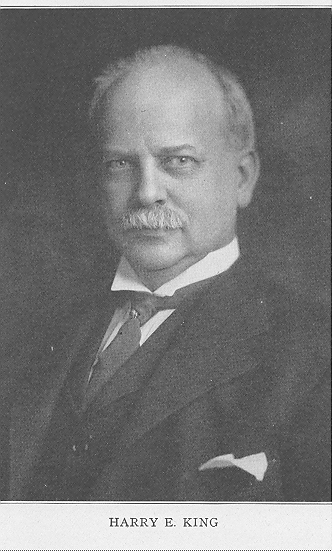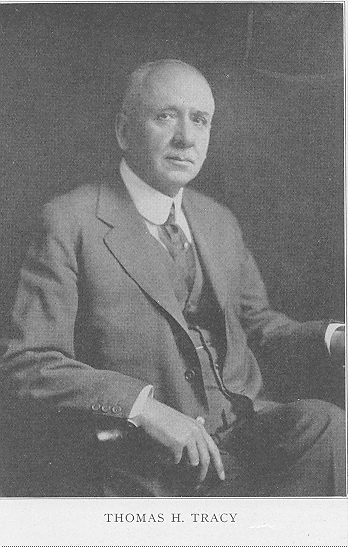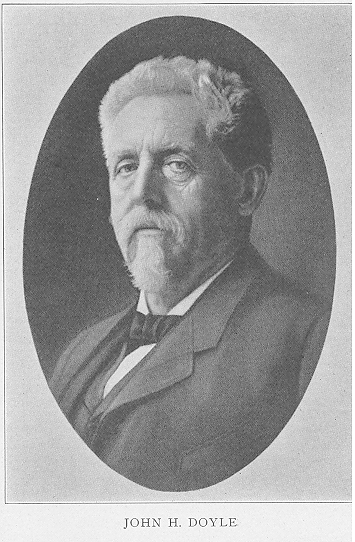TOLEDO AND LUCAS COUNTY - 25
Medical College and proved a most capable educator through the readiness and clearness with which he imparted to others the knowledge that he had acquired. A brilliant and illuminating orator, a keen logician, an effective persuader and therefore ,a leader; imbued with high ideals, a most vigorous hater of shams and hypocrisies, and a consummate master of every subject upon which he consented to speak, he was in great demand for addresses and arguments upon a vast variety of topics.
Mr. Brown was an eminently accomplished and successful advocate, an expert examiner and a master of cross-examination. Having a thorough knowledge of his own case and an instant appreciation of every weak development in that of his adversary, his conduct of a trial was always masterly and his arguments, whether to judge or jury, were splendidly effective. He often boldly disregarded conventional methods, as when in a crim. con. trial, in which he represented the plaintiff, he called as his first witness and at great length examined the defendant himself, an innovation amply justified by the result.
In 1885 Mr. Brown was retained as counsel for a committee of bondholders, who thereafter purchased what has since been familiarly known as the Clover Leaf Railroad, extending from Toledo to St. Louis, and from that time until his death he was the general solicitor of the successive corporations owning and general counsel for the receivers 'operating that railway. In such capacities he conducted, to the entire satisfaction of his clients, a vast variety of involved litigation. His logical mind, profound knowledge of legal principles and instant application of them to novel conditions, made him singularly happy in making first impressions. Such actions, of vital importance, arose in the construction of the Manufacturers and Toledo Terminal Railways, in the acquisition by the Hocking Valley Railroad of extensive terminals in East Toledo, and. in contests over property rights in subterranean streams, and over the powers of a municipality to build lines for piping natural gas from productive fields and to assess upon abutting properties the damages awarded its owners, either upon a change of a street grade or for opening and extending a street. Some of such actions received very wide attention and brought from attorneys in different parts of the country many requests for Mr. Brown's briefs.
It was, however, as counsel that Mr. Brown achieved his greatest though less conspicuous success. During his later years he appeared very rarely in the courts. He was a safe and sane adviser, keeping clients out of litigation. Moreover, he had executive and financial ability of a very high order. At the time of his demise he was president of The Owens Bottle Machine Company and president of the Toledo Times Publishing Company. He was also vice president of the Toledo Glass Company, the Libbey-Owens Sheet Glass Company and the Owens European Bottle-Machine Company, as well as a director of the Hocking Valley Railway and also of the Ohio State Telephone Company. Outside of the domain of business Mr. Brown had many and varied interests. He was a trustee of the Toledo Museum of Art, a member of the advisory committee of the Toledo Hospital, a director of the Castalia Trout Club and the Toledo Riding Club, and a member of many other clubs, including the Toledo, Toledo Country, Commerce and Yacht clubs, the Columbus Club and the Ottawa Shooting Club.
An active member of the republican party, he served as one of the early presidents of the Ohio League and was a delegate to the republican national convention in 1888. Mr. Brown traveled extensively throughout the United States, Europe
26 - TOLEDO AND LUCAS COUNTY
and, South America. His favorite sport was fishing and he was often active at the Castalia Trout Club and fished many trout streams. He was one of three lessees of a salmon stream in eastern Quebec, visiting it each year for a few weeks, and he also made annual trips to ,Florida for tarpon fishing.
He contributed largely, often in the name of others and often anonymously, to public and private charities. The wide scope of his sympathies is to some extent indicated by his will, in which, after making ample provision for Mrs. Brown, he bequeathed sums ranging from five hundred to fifty thousand dollars to thirty-six individuals, including relatives, partners, friends and employes, and the residue of his estate, estimated at one million dollars, in trust, the income to be paid to Mrs. Brown during her lifetime and the capital to be, after her death, paid in various proportions to the Toledo, St. Vincent's, Mercy, Maternity and Children's Hospitals, the Toledo Museum of Art, the local Young Men's and Young Women's Christian Associations, the Red Cross, the Salvation Army, the Flower Deaconess Home, the Toledo Newsboys Association, the Old Ladies' Home, the District Nurses Association, the Federation of Jewish Charities, the Little Sisters of the Poor, the Colored Working Girls Home, the Old Adams Street City Mission, the North Toledo Settlement, the Florence Crittenden Home, the Luella Cummings Home and the Thalian Society. Thus his good works follow him and those who are benefiting by his benefactions rise up and call him blessed.
ANNA KATHERINE VOGLER
Anna Katherine Vogler, superintendent of the Flower Hospital, has devoted her life to the noble work of assisting humankind in a way that has won the gratitude and admiration of the world throughout the ages. A daughter of Henry and Magdalene Vogler, she is a native of Columbus, Ohio, and was but two years of age when her parents removed with the family to Toledo, so that she acquired her education in this city, her entire training being received under private tutelage in her own home, her course, however, making her eligible for entrance into any college. In 1911 she entered Flower Hospital for training, putting in the prescribed time and graduating with the class of 1914. She continued with the hospital and in 1915 had charge of the laboratory, which was installed that year, so that consequently she became the first attendant. In 1916 she was made night supervisor and in 1917 she was advanced to the position of superintendent of nurses. During the war while registered with the Red Cross for foreign service she was delegated to remain in charge of Flower Hospital and was made superintendent. Her labors there were very arduous during the war period, when there was a scarcity of nurses everywhere and in 1919, being badly in need of a rest, she left for an extended tour of the west, remaining on the Pacific coast until June, 1921, when she returned and resumed her position as superintendent of the hospital, having been away on a leave of absence.
Miss Vogler is a member of the Methodist church and she belongs to various professional societies, having membership in district No. 9 of the Nurses Association, also in the Ohio Hospital, the American Hospital, the National Hospital and the Protestant Hospital associations. In a word, she improves every opportunity that will advance her knowledge and promote her efficiency in her chosen calling. Prompted by the broadest spirit of humanitarianism she is giving her service to
TOLEDO AND LUCAS COUNTY - 27
the public in ways that often entail self-sacrifice, finding her reward in a sense of duty faithfully performed. There are scores, however, who at mention of Miss Vogler bear testimony not only to her high professional ability but to her splendid executive power as superintendent of the hospital and of her kindly and helpful nature, manifest always in a ready smile and in an encouraging word.
ALLAN BOATH WILLS
Allan Boath Wills occupies a prominent position in business circles of Toledo as treasurer of The Donovan Wire & Iron Company and has contributed in no uncertain degree to the steady growth and development of the enterprise. He was born in Detroit, Michigan, on the 12th of March, 1881, and received his more advanced educational training as a student in the University of Michigan, where he became a member of the Sigma Alpha Epsilon fraternity. Well qualified for life's practical and responsible duties, he entered business circles and has attained a position of executive control as treasurer of The Donovan Wire & Iron Com-pany of Toledo, in which connection he is active in the management of one of the prosperous and growing commercial concerns of the city.
On the 12th of June, 1909, in Toledo, Mr. Wills was united in marriage to Miss Julie F. Brinkman, a daughter of George Brinkman of this city. Mr. Wills is a worthy exemplar of the Masonic fraternity, in which he has attained the thirty-second degree of the Scottish Rite, and holds membership in the Toledo Club. Upright and honorable in the varied relations of life, he enjoys an. enviable reputation in both business and social circles of his adopted city and has an extensive circle of warm friends here.
GEORGE JOHN MARQUARDT
Commercial enterprise and progressiveness find expression in the business career of George John Marquardt, who is now the president of the George J. Marquardt Company, controlling one of the large hardware establishments of Toledo. His life story—a tale of successful achievement in which industry and intelligence have chiefly figured—is an interesting one. He was born in New York city, February 5, 1862, and is a son of John George and Elizabeth M. (Huff) Marquardt. The father was a merchant and manufacturer who after carrying on busi-ness in the east for a time removed to Sandusky, Ohio, in 1863, and there engaged in cabinet manufacturing and wood carving.
George John Marquardt obtained his education in the public schools and under a private tutor and the year 1885 witnessed his arrival in Toledo, at which time, then a young man of twenty-three years, he secured a clerkship in a hardware store. For thirteen years he was connected with the Bostwick & Braun Company and acquainted himself with every phase and department of the trade. He then withdrew from that connection to become one of the organizers of the Shunck & Marquardt Hardware Company, under which firm style the business was carried on until 1911, when it was reorganized under the name of the George J. Marquardt Company, of which he has since been the president. Their establishment
28 - TOLEDO AND LUCAS COUNTY
is now one of the .large hardware houses of the city and everything known to the trade is there found, while the business methods of the house commend it to the public and a liberal patronage has long been enjoyed.
In October, 1885, Mr. Marquardt was married to Miss Mary Steuer of Toledo and they have three children : Evan George, who is secretary and treasurer of the George J. Marquardt Company ; Alice ; and George Richard, who is one of the directors of the company. All of the children are married. The elder son wedded Hazel Martin and they have two children, Caroline and Marion. The daughter, Alice, is the wife of Fred Bosselman of Toledo and they have one son, Frederick. George Richard Marquardt wedded Bertha West and they are parents of a daughter, Jane Lucile.
In his fraternal relations Mr. Marquardt is a Mason and has attained the thirty-second degree of the Scottish Rite. He is a representative of his line of business in the Rotary Club but has never been a clubman in the usually accepted sense of the term. Business affairs have claimed the major part of his time and attention, yet he does not relegate the duties of citizenship to the background but cooperates in all those forces which make for higher civic standards, for growth and progress in the business life of .the community and for the advancement of those intellectual and moral forces which are the outstanding features in good citizenship. Mr. Marquardt has lived for a number of years at No. 920 West Woodruff avenue, his home being one of the early ones built in that section.
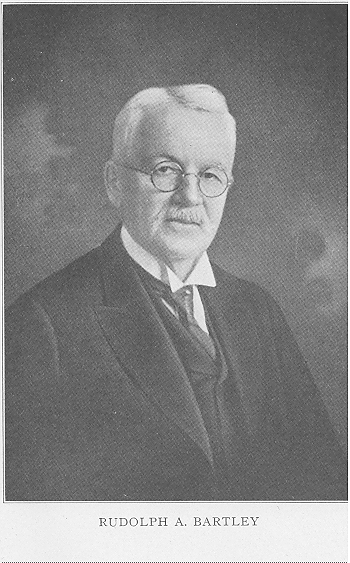
RUDOLPH A. BARTLEY
There is no success in life without effort. The purpose of life is to afford opportunity for physical, mental and spiritual development. In our country these opportunities are offered in turn to everyone who is willing to embrace them. Humble birth and poverty are no handicap to American youths but opportunities slip away from the sluggard and tauntingly play before the dreamer, yet they surrender to the individual with high purpose, undaunted courage and indefatigable determination. A recognition of the real value of industry and persistency has enabled Rudolph A. Bartley to rise from a humble position in the business world to a place among the foremost wholesale merchants of Toledo and the state. Not by leaps and bounds has he advanced but by that steady progression which indicates the mastery over self, over environment and over conditions. Born in Wittenberg, Germany, in 1851, Rudolph A. Bartley is a son of Gebhardt Bartley, a baker by trade, whose careful saving of his earnings enabled him to bring his family to the new world in 1853, settlement being made in the village of Perrysburg, in the Maumee valley of Ohio, while a little later the family home was established on a farm not far distant.. There the mother passed away, leaving three children to the care of the father.
Spending his youthful days under the parental roof Rudolph A. Bartley enjoyed only such educational opportunities as the district schools afforded. In 1868, when a youth of sixteen years, he came to Toledo and since that time, covering a period of more than a half century, he has been closely associated with the grocery trade. His original position here was that of employe in the grocery and general store situated at St. Clair and Adams streets and owned by H. & F. Barnes. The arrangement with his father was that he should send home fifteen dollars a month in
TOLEDO AND LUCAS COUNTY - 31
lieu of his services on the farm. He began work, however, at a wage of only eight dollars per month so that he had to go in debt for the remaining seven. His capability and faithfulness, however, soon won him promotion and an increased salary, but though his wage was advanced to fifteen dollars per month all this went to pay his father. Further promotion, however, enabled him to wipe out his indebtedness and at the end of the first year he was receiving twenty-five dollars per month in the general store of J. A. Spyer, at the corner of Summit and Orange streets. From time to time he received an increase in his earnings and by the time he had attained his majority he had saved two hundred dollars. He then negotiated a loan of one hundred dollars from B. F. Richardson and with his combined capital of three hundred dollars he entered into partnership with Enos Cousino, opening a retail grocery house in 1872, under the firm style of Cousino & Bartley. They occupied a little two-story building and bent every energy toward the development of the trade. They employed no outside help but did all the work themselves and slept in the store at night. They delivered their goods from a hand cart, each partner delivering that which he sold and by reason of their close application, thoroughness and enterprise the business kept steadily growing in volume and importance, so that in 1882 Mr. Bartley was able to purchase his partner's interest and in the same year he acquired by purchase the retail grocery house of J. C. Wuerfel. He then removed his main stock into the double brick building next door, originally occupied by Wuerfel, while the old storeroom was used as a warehouse. In the meantime he had begun selling to the wholesale trade and this department of his business was manifesting a steady and gratifying growth. By 1887 he had discarded the retail end of the business entirely and was devoting his attention exclusively to the wholesale trade. In that year the store was removed to the corner of Summit and Lynn streets, where Mr. Bartley occupied a four-story business block, considered then a large store. In 1897 a two-story warehouse was erected, adjoining the larger building and a year later a five-story structure was erected at the other end, so that the group of buildings occupied the entire block from Lynn to Cherry streets, on Summit. A disastrous fire occurred, however, in 1908, and for some time thereafter the business occupied temporary quarters at Monroe and St. Clair streets, until Mr. Bartley had perfected his plans for a new business block. He selected the highest point of land in the business district, at the corner of Washington and Ontario streets, and one especially adapted to the wholesale trade, having railroad tracks at the door. There he erected a seven-story and basement fireproof structure one hundred and forty by one hundred and twenty feet, with a total floor space of more than five and a half acres. This building has every equipment requisite to the requirement of a large and growing trade. The trade covers the three states of Ohio, Indiana and Michigan and a large number of office people, clerks and salesmen are employed. The business is today one of the most important commercial interests of Toledo and the state and has been a large contributing factor to the commercial development of the city. Mr. Bartley is also a director of the National Bank of Commerce and has long figured as one of the foremost business men of Toledo.
In early manhood Mr. Bartley wedded Mrs. Hattie Josephine (Barnes) Dutton of Adrian, Michigan, a daughter of Dr. L. B. and Olive Leaf (Evans) Barnes. Her father was a well known physician and surgeon of southern Michigan and northern Indiana and Ohio. For many years he resided on a farm in Calhoun county, Michigan, near Union City, where both he and his wife passed away. Mrs. Bartley was born in Steuben county, New York, and was graduated from the high school at
32 - TOLEDO AND LUCAS COUNTY
Coldwater, Michigan, after which she attended Professor Taylor's College in Lansing, Michigan. By her first marriage she had a son, Charles E., who was reared by Mr. Bartley as his own child, and has taken the name o f Bartley. He resides in Chicago, Illinois. Mr. and Mrs. R. A. Bartley reared from babyhood, Virginia, the daughter of Charles E. Bartley. She finished her schooling at the Miss Mason School for Girls, at Tarrytown, New York. She married Charles West Peckinpaugh of Toledo, and their three children are : Charles West, Jr., Richard Bartley and David William. Before her second marriage Mrs. Bartley taught school in different sections of Calhoun county and following her marriage she displayed splendid business ability, giving active assistance to Mr. Bartley in the conduct of the wholesale grocery house. She acted as bookkeeper and managed the financial end of the business and Mr. Bartley has always given great credit to her for his success. She possesses keen insight and sagacity and has displayed marked intuition in directing business affairs and expanding the interests under their control. After a time she ceased to take active part in the management of the business and turned her energies to various social and civic service plans. She has been an untiring worker in the church and along other lines. She holds membership in the First Baptist church and has contributed to the growth and development in all the departments of the church and Sunday school work. She belongs as well to the Shakespeare Club, to the Woman's Educational Club, to the Woman's Building Association and has done much for the woman's suffrage movement. She has always kept abreast with the best in literature and their private library is one of the finest to be found in any home in northern Ohio. Her benevolent spirit has found expression in substantial assistance to many but in this she follows the precept not to let the left hand know what the right hand doeth. However, she has reared three girls from the respective ages of eight, ten and twelve years and also three boys, giving to them the advantages of a splendid home and the best educational training possible. She has lived to see them grow up to useful manhood and womanhood and take their places in society, occupying homes of their own. Mr. Bartley has been an important factor in the life of the community aside from his extensive business and no good work done in the name of charity or religion seeks his aid in vain, while his cooperation can at all times be counted upon for the progress of social and civic service. He was for two terms president of the Toledo Business Men's Chamber of Commerce and is now a valued member of the Toledo Commerce Club. He served for five years as a member of the Toledo board of education, acting as president theref for two terms and for a number of years he has been a director of the Toledo Humane Society, while for a considerable period he was president of the Adams Street Mission. Just as they worked together in the upbuilding of the business so Mr. and Mrs. Bartley have held to kindred interests in their efforts to uplift humanity and improve conditions of society in general. The record of Mr. Bartley is indeed one that should serve to inspire and encourage others. In his business life he has been a persistent, resolute and energetic worker, possessing strong executive power, 'keeping his hand steadily upon the helm of his business and strictly conscientious in his dealings with debtor and creditor alike. Keenly alive to the possibilities of every new avenue opened in the natural ramifications of trade he has passed over the pitfalls into which unrestricted progressiveness is so frequently led and has been enabled to focus his energies in directions where fruition is certain. If a pen picture could accurately delineate his business characteristics they might he given in these words : A progressive spirit ruled by more than ordinary intelligence and good judgment a deep
TOLEDO AND LUCAS COUNTY - 33
earnestness impelled and fostered by indomitable perseverance ; a native justice expressing itself in correct principles and practice. Mr. Bartley's residence is at No. 1855 Collingwood avenue, and was erected by him in 1906.
ROBERT J. BURNOR
Business development in Toledo has found stimulus in the efforts of Robert J. Burnor, an unusually capable and enterprising young business man, who is engaged in the real estate and insurance business, and his intelligently directed labors have been attended with a gratifying measure of success. He was born in this city on the 1st of February, 1890, and is a member of one of the old and well known families of Toledo. He is a son of Peter and Rosa (Bartley) Burnor, the former a native of Adrian, Michigan, and the latter of Toledo. In early life the father came to this city, where he has since made his home, and for many years he has successfully conducted a trucking and transfer business, being highly regarded in commercial circles of Toledo. The mother also survives and they have become the parents of six children, five of whom are living, namely : Roman G. and Robert J., both residents of this city ; Mrs. Angela B. Siess, who is living in Cleveland, Ohio ; Marjorie; and Beatrice, who is unmarried and also makes her home in Toledo.
In the acquirement of an education Robert J. Burnor attended St. Mary's parochial* school and St. John's College, after which he entered the University of Michigan, of which he was a student for a year. He then returned home and embarked in the merchandise brokerage business, upon which he concentrated his attention for several years, meeting with success in his efforts. He continues to operate that enterprise but now devotes the major portion of his time to the general real estate and insurance business, having organized the Robert J. Burnor Company in November, 1920. They have negotiated many. important realty transfers, while they also write a large amount of insurance annually, and under the capable direction of Mr. Burnor, who acts as president and manager of the company, the business is rapidly developing. He is also a director of the Lucas County Mortgage Company and has never hesitated to. extend his interests as opportunity has offered, being alert, energetic and determined in the conduct of his business affairs.
Mr. Burnor is a communicant of the Roman Catholic church and is also connected with the Knights of Columbus, in which he has taken the fourth degree. In politics he maintains an independent attitude, casting his ballot in favor of the candidate whom he deems best fitted for office without regard to party ties. As a member of the Toledo Chamber of Commerce he does all in his power to promote the industrial expansion of his city and the nature of his recreation is indicated by his connection with the Toledo Yacht Club and the Maumee River Yacht Club. He belongs to Bartelle Post, American Legion, being a veteran of the World war, in which he served for sixteen and a half months as a member of the Eighty-third Division of the United States army. For seven and a half months he was stationed at Camp Sherman and was then sent overseas, in the Le Mans sector. Since starting out in the business world he has made continuous advancement and his record is that of a self-made man who has won success through industry and
34 - TOLEDO AND LUCAS COUNTY
ability. He is enterprising and aggressive in his operations, straightforward and reliable in all business transactions, and is enthusiastic in exploiting the resources and attractions of the city, which is proud to claim him as a native son.
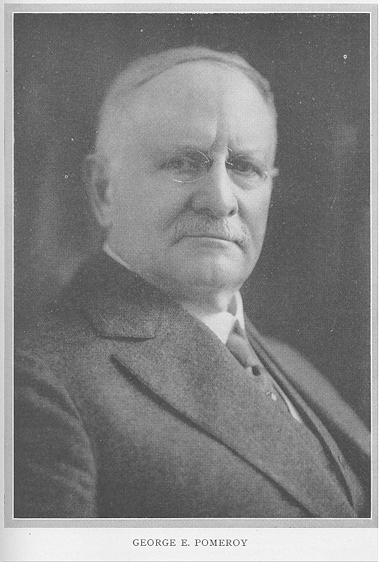
GEORGE ELTWEED POMEROY
The history of any city is nothing more than a record of the lives of its citizens whose activities have been contributing factors to its growth and development, and any history of Toledo, particularly that of the past forty years, would be incomplete without a biographical mention of George Eltweed Pomeroy, dean of the city's real estate men, banker and prominent citizen.
The life story of George Eltweed Pomeroy had its beginning in Clinton, Michigan, where he was born November 28, 1848. He comes from a fine old New England family, that was established in the Plymouth Rock Colony in 1630, by Eltweed Pomeroy, the American progenitor.
In 1912 Colonel Albert A. Pomeroy published a genealogy of the Pomeroy family, giving a complete list of the descendants of this Eltweed Pomeroy through eleven generations and comprising one of the most valuable contributions ever made to American genealogical literature. The English ancestry of the Pomeroy family is traced back through a long line of distinguished warriors and statesmen to Normandy. Sir Radulphus De Pomeraie of St. Sauveur de la Pomerai in Normandy, chief of staff of William the Conqueror, was the progenitor of the family in England and was an active participant in the battle of Hastings in 1066. In a later generation the name was Anglicized to Ralph de Pomeroy and the family has figured prominently in the southwestern counties of England through several centuries or since the time of the Norman conquest. Vast estates were granted to the founder of the family in Devonshire and his descendants maintained their feudal position through centuries of strife.
The family has been represented in America since 1630, when Eltweed Pomeroy came to the new world, having previously engaged in the manufacture of guns in England. He settled first at Dorchester, Massachusetts, and was offered a grant of a thousand acres of land by the Massachussetts Bay Colony if he would establish a gun factory in the colony. This he did and seven generations of the family continued the business. One of the original anvils is still in possession of his descendants.
George Eltweed Pomeroy of Toledo, is a descendant in the eighth generation of the family in this country, the line of descent being as follows, the Roman numerals indicating the generation :
